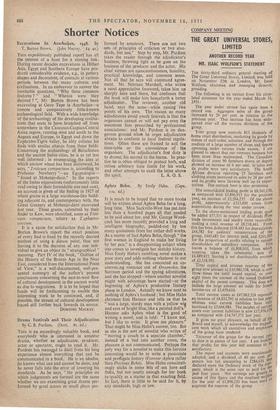Aphra Behn, By Emily Hahn. (Cape. 12s. 6d.) IT is
much to be hoped that no more books will be written about Aphra Behn for a long, long time. Miss Sackville-West has put. into less than a hundred pages all that needed to be said about her, and Mr. George Wood- cock has more recently provided a long and intelligent biography, padded-out by too many quotations from her rather dull works. As a matter of fact Aphra Behn, though "the first woman in England to make her living by her pen," is a disappointing subject when one conies to investigate her sketchy history. Miss Emily Hahn's rambling novel makes a poor story and adds nothing whatever to our understanding. She has concocted an un- convinc:ng romance out of Oroonoko, the Surinam period and the spying adventures, and she has stopped—where another novelist might with advantage have started—at the beginning of Aphra's productive literary phase in London. Actually we know next to nothing of Aphra's husband ; but Miss Hahn christens him Haunce and tells us that he "was a large, sturdy man with a yellow wig and eyes of bright blue, like a painted doll's." Haunce asks Aphra what is the good of writing a novel, and is told: "I know not, but I like to write. It gives me pleasure." That might be Miss Hahn's answer, too. But as she is the sort of novelist who writes of "moving a couch to a separate chamber," instead of a bed into another room, the pleasure is not communicated. Perhaps the only way for a novelist to make this heroine interesting would be to write a passionate and profligate history (Forever Aphra rather than Precious Behn). Miss Hahn conscienti- ously sticks in some bits of sex here and thetre, but not nearly enough for her book to .qualify as a starter in that exacting field. In fact, there is little to be said for it, by any standards, high or low.














































































 Previous page
Previous page